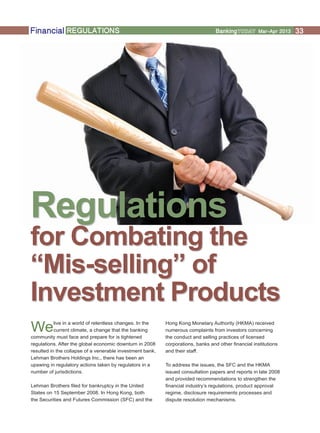The document summarizes new regulations implemented by Hong Kong regulators to combat mis-selling of investment products following the 2008 global financial crisis. It outlines key changes to the Code of Conduct imposed by the Securities and Futures Commission (SFC) including stricter suitability assessments and disclosure requirements. It also describes findings from an SFC report that many licensed financial companies failed to properly follow the new regulations, such as conducting inadequate due diligence on investment products and client risk profiling. Overall, the document discusses ongoing efforts by Hong Kong regulators to close the gap between financial regulations and actual sales practices in the industry.








